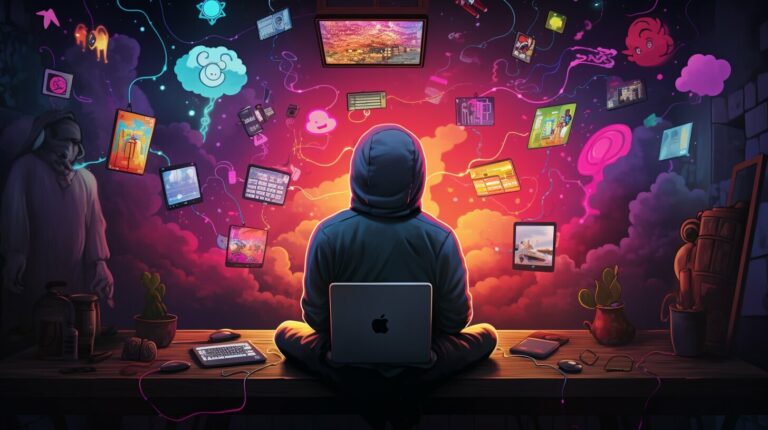Why Shuai Has Leaders Spooked
In a world where information is power, there exists a force that has leaders trembling in their boots. Its…

In a world where information is power, there exists a force that has leaders trembling in their boots. Its name is Shuai, and its language generation capabilities have the potential to reshape traditional media as we know it. This advanced artificial intelligence has not only caught the attention of industry giants but also ignited ethical questions about its impact on society.
With each passing day, Shuai’s abilities continue to evolve, leaving us pondering the future of AI and its consequences for our daily lives.
But why are leaders spooked by Shuai? Imagine a world where news articles can be generated instantaneously with impeccable grammar and coherence. It challenges the very foundation of traditional journalism and raises concerns about accountability and trustworthiness.
As we navigate this brave new world, it becomes imperative to address these concerns head-on and build safeguards that ensure ethical boundaries are not crossed.
Join us as we delve into the intriguing developments surrounding Shuai’s rise to prominence and discuss how society can adapt to this technological revolution while preserving transparency and integrity in our ever-evolving media landscape.
Key Takeaways
- Shuai’s powerful language generation abilities have caught the attention of industry giants and pose a challenge to traditional journalism.
- Leaders are concerned about the impact of Shuai on accountability and trustworthiness in media, as it blurs the lines between real and AI-generated content.
- Ethical concerns arise from Shuai’s advancements, including bias, misinformation, and job displacement.
- Collaboration between tech companies, governments, and experts is necessary to address the ethical implications of AI development and build safeguards for responsible use.
The Capabilities of Shuai’s Language Generation
Shuai’s language generation capabilities are so mind-blowing that leaders are left completely spooked! With advancements in natural language processing, Shuai has the potential to revolutionize how we interact with technology.
Its ability to understand and generate human-like text is unprecedented, raising concerns about its impact on traditional media. Shuai’s potential lies in its capacity to effortlessly produce coherent and contextually appropriate responses, mimicking human conversation.
This breakthrough in language generation has far-reaching implications for various industries, including customer service, content creation, and even journalism. As Shuai continues to evolve, it poses a significant challenge to traditional media outlets that rely on human-generated content.
The impact of this technology on the future of news production cannot be ignored as it blurs the lines between what is real and AI-generated.
The Impact of Shuai on Traditional Media
The disruptive force of Shuai is causing traditional media to tremble in fear. With its advanced language generation capabilities, Shuai has the potential to revolutionize the way news and information are disseminated. Its ability to generate content quickly and efficiently threatens the traditional process of news creation and distribution.
This disruption brings both challenges and opportunities for traditional media outlets. On one hand, they face the risk of being overshadowed by Shuai’s innovation and losing their audience. On the other hand, they have the chance to adapt and embrace this technology as a tool for enhancing their own content creation processes.
However, ethical questions raised by Shuai’s advancements need careful consideration, including issues of bias, misinformation, and accountability. These concerns will be explored further in the subsequent section about ethical questions raised by Shuai’s advancements.
Ethical Questions Raised by Shuai’s Advancements

Ethical quandaries emerge as Shuai’s advancements in automation and artificial intelligence challenge traditional media. With its ability to generate news articles, videos, and even social media posts at an unprecedented speed and scale, questions arise about the ethical implications of such technology.
One key concern is the potential for misinformation and propaganda to spread rapidly through Shuai’s automated platforms, further blurring the line between fact and fiction. Additionally, there are concerns about job displacement within the media industry as AI takes over tasks traditionally performed by human journalists.
The impact on journalistic integrity also raises ethical questions, as algorithms may not possess the same level of critical thinking or adhere to ethical standards that human journalists do.
As society grapples with these challenges, it becomes crucial to carefully navigate the intersection of technology and ethics. Looking ahead, understanding the implications of AI for society requires a careful examination of its potential risks and benefits.
The Future of AI and Society
As AI continues to advance, society must grapple with the profound implications it will have on our daily lives and the way we interact with technology. The future of AI raises important questions about job displacement and privacy concerns that need to be addressed.
Job Displacement:
- Automation powered by AI has the potential to replace certain jobs, leading to unemployment for many individuals.
- New jobs may also emerge as a result of advancements in AI, but retraining and upskilling will be crucial for workers to adapt.
- The balance between job creation and loss needs careful consideration for a smooth transition into an AI-driven society.
Privacy Concerns:
- With AI’s ability to collect vast amounts of data, there are concerns about how this information is used and protected.
- Safeguards should be implemented to ensure transparency, consent, and secure storage of personal data.
- Striking a balance between technological advancements and individual privacy rights is essential.
In order to address these concerns and build safeguards for the future, proactive measures must be taken.
[Sentence transition]
Addressing Concerns and Building Safeguards
Regulation and oversight of AI technology is crucial in order to address concerns and build safeguards. Collaboration between tech companies, governments, and experts is also necessary to ensure the responsible development and deployment of AI.
By working together, these stakeholders can establish guidelines, standards, and ethical frameworks that promote transparency, accountability, and the protection of human rights in the advancement of AI technology.
Regulation and Oversight of AI Technology
With the growing influence of AI technology, leaders are finding themselves on edge as they grapple with the need for effective oversight and control. Government intervention has become a pressing concern, as policymakers seek to establish regulations that balance innovation and ethical considerations. The rapid advancements in AI capabilities have raised questions about privacy, bias, and accountability. To address these concerns, there is a growing focus on developing AI ethics frameworks that guide the responsible use of this technology. Additionally, leaders are exploring ways to ensure transparency and accountability in AI systems through audits and independent oversight bodies. Collaboration between tech companies, governments, and experts is crucial in navigating these challenges and finding solutions that promote trust and confidence in AI applications.
Transitioning into the subsequent section about collaboration between tech companies, governments, and experts: As discussions intensify around regulating AI technology, it becomes evident that a collaborative approach is necessary to navigate this complex landscape effectively.
Collaboration between Tech Companies, Governments, and Experts
The power of collaboration between tech companies, governments, and experts in shaping the future of AI technology is truly awe-inspiring. In order to navigate the complex landscape of AI, it’s crucial for these stakeholders to work together.
Tech companies bring innovative ideas and technological expertise, while governments provide regulatory frameworks and policies. Experts offer valuable insights and guidance.
One key area where collaboration is needed is in addressing privacy concerns arising from AI technology. Governments play a vital role in setting clear guidelines and regulations to protect individuals’ privacy rights. This involves developing robust data protection laws and ensuring that AI systems are transparent and accountable.
By working hand in hand with tech companies and experts, governments can strike a balance between fostering innovation and safeguarding privacy.
The collaboration between tech companies, governments, and experts paves the way for responsible development and deployment of AI technology. Through open dialogue and shared knowledge, they can create a future where AI benefits society while upholding ethical standards.





